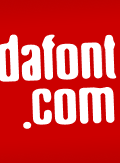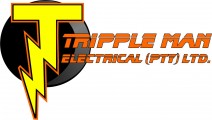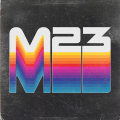Forum
393 posts Identified fonts
Posts by conman1985
Original is pre-digital Zarana from Compugraphic. Watford is a digital clone.
Suggested font: Watford Zarana
Based on Stop (1971) by Aldo Novarese. The 'S' has either been pulled from another typeface or crafted from parts of the '2' or '5'.
Suggested font: Stop
Original is a phototype from VGC called Primus. Castcraft OPTIFonts also had a digital version of the Primus family that is no longer available. Brendel/Typeshop Collection have a version for sale called Priamos. Your sample is heavier than the heaviest weight digitally available.
Suggested font: Priamos Heavy
Television by Klaus Richter. Mecanorma had it available as Dry Transfer Lettering once upon a time.
Only digitization is the very rough Boob Toob by Gaut Fonts.
Was also available here:
moorstation.org/typoasis/designers/gaut/htm/boob.htm
Only digitization is the very rough Boob Toob by Gaut Fonts.
Was also available here:
moorstation.org/typoasis/designers/gaut/htm/boob.htm
Suggested font: Boob Toob
Custom logotype based mainly on the Futura family of typefaces. The 'M' and the '3' are possibly based on Gill Sans - but both could have been created from scratch. You'll never get an exact match as the type has been distorted/redrawn to fit the specific perspective without compromising legibility.
Edited on May 22, 2017 at 12:55 by conman1985
Edited on May 22, 2017 at 12:55 by conman1985
A little lighter than poster sample. Probably due to photographic processes used to reproduce type during 80's. Trade Gothic Pro Condensed #20 is too bold and contains straighter sides to 'e' and 'c' glyphs.
Suggested font: Trade Gothic Pro Condensed #18
Suggested font: Helvetica Black Oblique
I believe this is a custom font most likely created as a replacement for the original phototype typeface used in T1-T3 titles and marketing materials. Photographic typesetting by the mid-to-late 1990's had pretty much been replaced by digital type. Artisan Entertainment and Van Ling put together the Special Edition and Ultimate Edition of T2 for Laserdisc and DVD which also featured this font in menus and video segments.
Identified font: Magmawave Caps
Identified font: Blade Runner Movie Font
EPILOGUE
Apparently, the original phototype was known as 'Corporate/Corporate Image' during the 70's and 80's. With a name like that, it's easy to see why many large companies and corporations adopted it for logotypes and branding. This is according to Phil Martin's Alphabet Innovations, for whom Roc Mitchell produced several typefaces. This is also not to be confused with the digitally available 'Corporate URW' also originally produced by Phil Martin/Alphabet Innovations as a phototype sometime during the mid-to-late 70's. It's possible this new version by Martin was intended as a replacement or companion to Mitchell's. Both typefaces build upon the geometric framework previously established by 'Microgramma Bold', designed by Aldo Novarese and Alessandro Butti for the Nebiolo Type Foundry in 1952, and 'Eurostile Bold Extended', designed by Aldo Novarese in 1962.
Alphabet Innovations 1974 Catalog - Vol. 1-8

Hard to make out in the above image, but it looks as if both 'Corporate' and 'Corporate Image' were included in Volume 4, which was published in January, 1971.

TIMELINE OF EVENTS
1952 - Aldo Novarese and Alessandro Butti design 'Microgramma' for the Nebiolo Type Foundry.
1962 - Aldo Novarese expands his previous 'Microgramma' design into the 'Eurostile' typeface family for Nebiolo Printech.
1971 - Roc Mitchell produces 'Corporate/Corporate Image' for Alphabet Innovations phototype range.
1979 - Dan X. Solo samples 'Corporate/Corporate Image' as 'Limited View' in his Solotype collection of typefaces. A stenciled version known as 'Preview' is also shown, perhaps developed by Solo himself.
1985 - The Nintendo Entertainment System is released in October to North and South American markets. It uses, not unlike many other companies of the era, 'Corporate/Corporate Image' as the typeface for branding its product range.
1991 - Castcraft produces 'OPTILimitedView' for their OPTIFonts range. As the naming implies, this is based upon the previous Solo sample from 1979. Castcraft also produces Expanded and Open/Outline versions of the font.
1991 - Jay Pierstorff/Computer Safari produces 'Airlock' which is based upon the stenciled version known as 'Preview' previously sampled/developed by Solo in 1979.
1999 - Roc Mitchell digitizes his original design in a series of fonts known as 'Logos/LogoStyle/LogoText'. These are sold through Roc Mitchell Design.
Apparently, the original phototype was known as 'Corporate/Corporate Image' during the 70's and 80's. With a name like that, it's easy to see why many large companies and corporations adopted it for logotypes and branding. This is according to Phil Martin's Alphabet Innovations, for whom Roc Mitchell produced several typefaces. This is also not to be confused with the digitally available 'Corporate URW' also originally produced by Phil Martin/Alphabet Innovations as a phototype sometime during the mid-to-late 70's. It's possible this new version by Martin was intended as a replacement or companion to Mitchell's. Both typefaces build upon the geometric framework previously established by 'Microgramma Bold', designed by Aldo Novarese and Alessandro Butti for the Nebiolo Type Foundry in 1952, and 'Eurostile Bold Extended', designed by Aldo Novarese in 1962.
Alphabet Innovations 1974 Catalog - Vol. 1-8

Hard to make out in the above image, but it looks as if both 'Corporate' and 'Corporate Image' were included in Volume 4, which was published in January, 1971.

TIMELINE OF EVENTS
1952 - Aldo Novarese and Alessandro Butti design 'Microgramma' for the Nebiolo Type Foundry.
1962 - Aldo Novarese expands his previous 'Microgramma' design into the 'Eurostile' typeface family for Nebiolo Printech.
1971 - Roc Mitchell produces 'Corporate/Corporate Image' for Alphabet Innovations phototype range.
1979 - Dan X. Solo samples 'Corporate/Corporate Image' as 'Limited View' in his Solotype collection of typefaces. A stenciled version known as 'Preview' is also shown, perhaps developed by Solo himself.
1985 - The Nintendo Entertainment System is released in October to North and South American markets. It uses, not unlike many other companies of the era, 'Corporate/Corporate Image' as the typeface for branding its product range.
1991 - Castcraft produces 'OPTILimitedView' for their OPTIFonts range. As the naming implies, this is based upon the previous Solo sample from 1979. Castcraft also produces Expanded and Open/Outline versions of the font.
1991 - Jay Pierstorff/Computer Safari produces 'Airlock' which is based upon the stenciled version known as 'Preview' previously sampled/developed by Solo in 1979.
1999 - Roc Mitchell digitizes his original design in a series of fonts known as 'Logos/LogoStyle/LogoText'. These are sold through Roc Mitchell Design.
Neither match but your sample is close to Museo Sans 900 (exljbris) or Platform Bold (Commercial Type).
Suggested font: Platform Bold
Close to a stretched NISESpaceHarrier which was based upon the original Space Harrier (1985) logotype.
Suggested font: NISE Space Harrier
Arial Black using Cyrillic characters is close. Using the Latin K rather than the Cyrillic.


Suggested font: Arial Black
See also:
PBIO by Gregor Adams, based upon lettering found on 1980's sound equipment by Roland using the 1970's Earth typeface.
PBIO by Gregor Adams, based upon lettering found on 1980's sound equipment by Roland using the 1970's Earth typeface.
Suggested font: Pbio
This particular sample is using Future Earth. Based upon a 1970's typeface known as Earth as seen in Dan X. Solo's 100 Complete Art Deco Display Alphabets (1982). Elfring Fonts possibly created the original typeface and has an alternate digital version available as Earth.
Character set:
https://www.elfring.com/earth1.htm
Character set:
https://www.elfring.com/earth1.htm
Identified font: Future Earth
Closest I could find digitally. Possibly others out there.

Edited on Apr 21, 2016 at 05:25 by conman1985

Suggested font: Clarendon Jordan
Edited on Apr 21, 2016 at 05:25 by conman1985
Identified font: Gravicon Display
All times are CEST. The time is now 10:58














